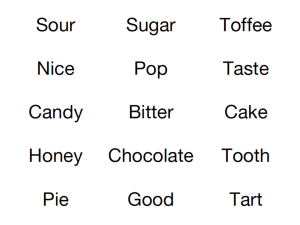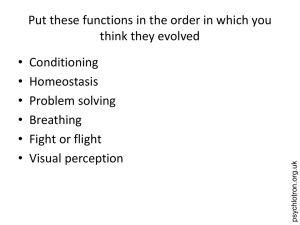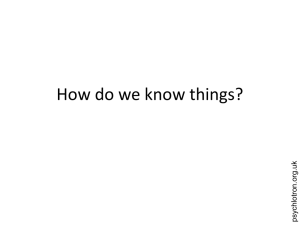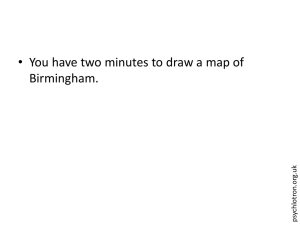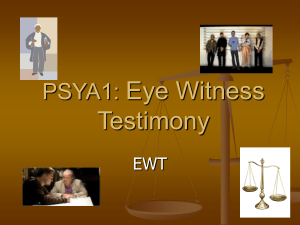Eyewitness testimony slides
advertisement
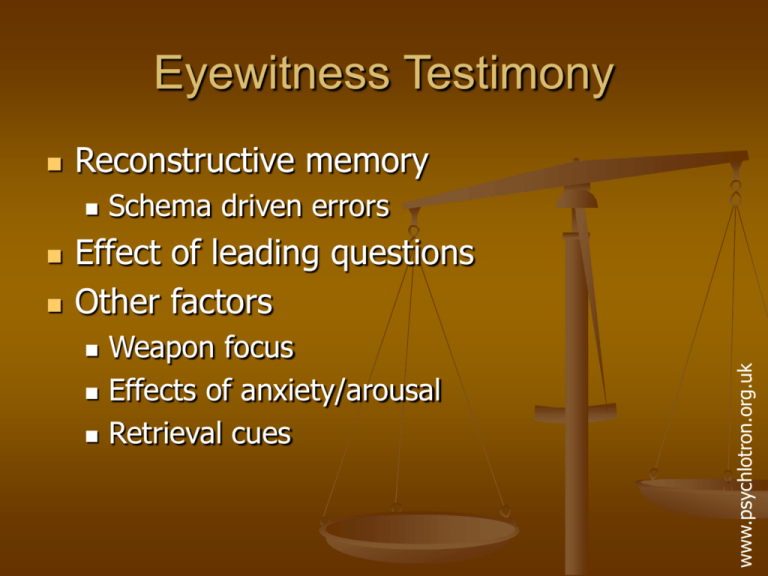
Eyewitness Testimony Reconstructive memory Schema driven errors Effect of leading questions Other factors Weapon focus Effects of anxiety/arousal Retrieval cues www.psychlotron.org.uk Reconstructive Memory Bartlett (1932) Memory is not a direct record of what was witnessed What is encoded and how it is retrieved depends on: Information already stored in memory How this info is understood, structured and organised www.psychlotron.org.uk Reconstructive Memory Schemas Knowledge structures that relate to commonly encountered objects, situations or people Enable us to predict events, make sense of unfamiliar circumstances, organise our own behaviour Act as filters to perception & recall www.psychlotron.org.uk Computer Information Processing BANG! www.psychlotron.org.uk Can you wreck a nice beach? Schema Driven Processing Yes. I can recognise speech. www.psychlotron.org.uk Can you wreck a nice beach? Bartlett (1932) Input Schema Output ‘Turf cutter’ Bartlett (1932) www.psychlotron.org.uk ‘Pickaxe’ Bartlett (1932) War of the Ghosts When recalled by UK PPs: Shorter Less detailed Some details changed (e.g. seal hunting changed to fishing) More ‘Western’ structure www.psychlotron.org.uk EWT: Schema Driven Errors Witnesses to crimes filter information during acquisition & recall Their schematic understanding may influence how info is both stored & retrieved Distortions may occur without the witness realising www.psychlotron.org.uk Past experiences Assumptions about what usually happens Stereotypes & beliefs about crime & criminals www.psychlotron.org.uk EWT: Schema Driven Errors EWT: Leading Questions Loftus (1970s onwards) Effect of leading questions on recall Leading questions introduce new information Leading info may activate wrong schemas in witness’ mind Consequently, witness may recall events incorrectly www.psychlotron.org.uk EWT: Leading Questions Loftus’ studies using film/video/slides road accidents ‘How fast were cars going when they hit…’ or ‘…when they smashed…’? ‘Smashed’ led to higher speed estimates ‘Did you see a/the broken headlight’? ‘The’ produced more affirmative (incorrect) responses www.psychlotron.org.uk EWT: Leading Questions Loftus’ research usually lab based: Restricted samples (students) Artificial stimuli (slides, videos, not real events) Potential for demand characteristics to influence responses No legal/moral consequences for inaccurate answers www.psychlotron.org.uk EWT: Leading Questions EWT most affected by leading Qs when: Witness them Witness Leading Leading believes questioner knows more than does not realise they may be misled information is peripheral, not central information is not blatantly incorrect www.psychlotron.org.uk When a weapon is used to threaten a victim, their attention is likely to focus on it Consequently, their recall of other information is likely to be poor www.psychlotron.org.uk EWT: Weapon Focus performance arousal Memory is most effective at moderate arousal levels If the witness was in a state of extremely low or high arousal then recall may be poor www.psychlotron.org.uk EWT: Arousal Effects EWT: Retrieval Cues Recall typically takes place in a different context to acquisition Lack of retrieval cues (state and context) can inhibit recall Reconstruction of the events (either imagination or simulation) can lead to enhanced recall www.psychlotron.org.uk
